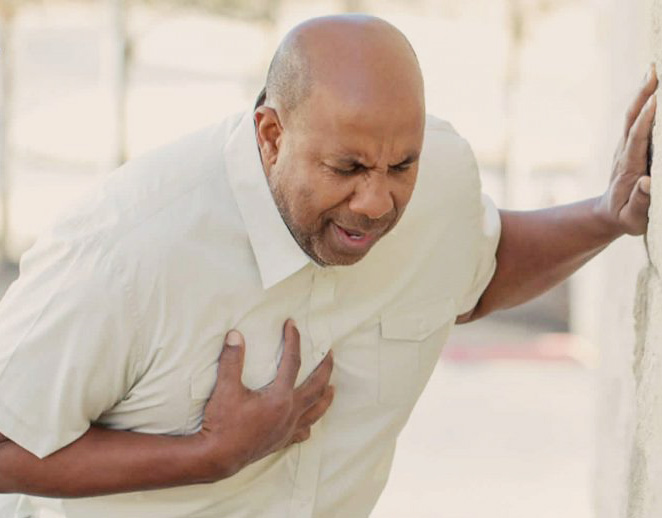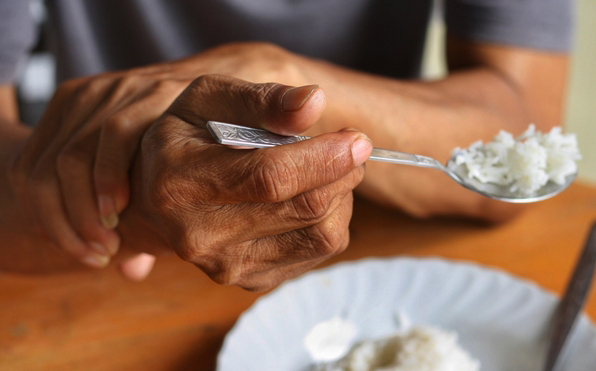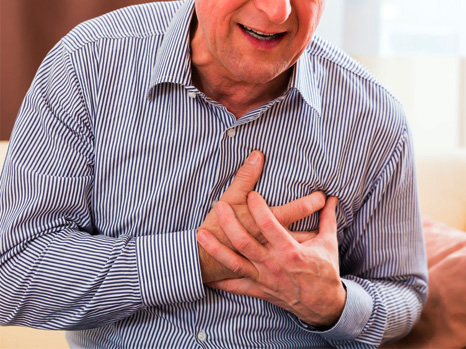Stroke: act quickly to limit the damage
- Posted on 30/10/2023 17:30
- Film
- By abelozih@sante-education.tg

Extract from the article: Troisième cause de mortalité, après les cancers et les cardiopathies ischémiques, et première cause d’incapacité motrice, les accidents vasculaires cérébraux (AVC) sont aujourd’hui un réel problème de santé publique au Togo. Des études menées récem
The
third leading cause of death after cancer and ischaemic heart disease, and the
leading cause of motor disability, strokes are now a real public health problem
in Togo. Recent studies carried out at
the Sylvanus Olympio and Campus teaching hospitals in Lomé have shown that more
than 50% of patients admitted to hospital are affected, and the number of
strokes is rising all the time. What is so special about strokes? What can be done to prevent and combat this
disease? Professor Mofou Bélo, a specialist in neurology and neurophysiology at
the Sylvanus Olympio University Hospital in Lomé, and Head of the
Non-Communicable Diseases Surveillance Division at the Ministry of Health,
offers some valuable insights.
The
national stroke situation is alarming. According to Pr Mofou Bélo, "in
2022, around 3,850 people went to hospital with a stroke. In Lome alone, 2,500
people suffered a stroke. Around 1,000 people died from it", he stressed
on 21 October 2023, during an awareness-raising campaign on stroke, organised
by the 3A association (Ananias, Azarias Misaël).
What
is a cerebrovascular accident?
This
is a sudden neurological deficit resulting in a motor or sensory deficit due to
obstruction or rupture of a cerebral artery. A stroke occurs when, for example,
a healthy person suddenly develops hemiplegia, loss of vision or loss of
language.
What
factors favour the onset of a stroke?
There
are two types of factors that contribute to stroke.Firstly, there are factors
that can be modified: these are factors that can be acted upon to prevent the
occurrence of a stroke.
These
are: high blood pressure, identified as a silent killer. It is the leading
factor in stroke.In Togo, over 80% of stroke victims are hypertensive;
diabetes, defined as high blood sugar levels. Diabetes creates a vicious
circle, as it is the cause of high blood pressure; obesity, as a person who is
obese is bound to have high blood pressure and diabetes. We have physical
inactivity, a person who is physically inactive will be obese, diabetic and
will have a high level of fat in the blood.He will end up with high blood
pressure; high blood fat levels are a very important factor in our country. The
low-fat diet is not respected.The consumer oils frequently found on our markets
are not controlled and are sometimes animal oils; taking the pill to avoid unwanted
pregnancies.
There's
also poverty: when you're poor, you can't buy your anti-hypertensive
medication; you can't go to the doctor. Poverty also means that health
facilities are under-equipped to deal with strokes.Raising the population's
standard of living can help prevent strokes; ignorance, because you can be rich
and have all the means, but when you're ignorant, it's like having nothing.We
need to fight illiteracy and step up awareness-raising too.
Other
factors include alcohol consumption, which leads to obesity, a sedentary
lifestyle, high cholesterol levels, fragile arteries and high blood pressure;
smoking, which creates atheromatous plaques that can lead to heart attacks and
strokes; and stress, which is considered a significant risk factor.
Then
there are the non-modifiable factors.
The older you are, the greater your risk of stroke.In our country, from
the age of 40 onwards, the factors seem to come into play and this is where we
need to be very careful. There's gender: worldwide, men are more at risk. But
in our country, housewives are the main victims because they are often
sedentary, obese and don't necessarily have information about the disease. And
race: studies carried out in South Africa and in the black American population
have shown that black subjects are more at risk, and it seems that there are
genetic factors involved.
What
are the causes of stroke?
Hypertension
and arteriovenous malformations are the cause of haemorrhagic strokes,
characterised by rupture of the arteries.
Ischaemic
strokes, characterised by the formation of a clot that blocks an artery in the
brain, are caused by high blood pressure, heart defects and myocardial
infarction.
What
are the warning signs of a stroke?
Apart
from sudden death, there are the following: sudden loss of language, sudden
loss of vision, loss of motor skills in half the body, balance problems,
vertigo, loss of feeling in half the body.
What
should you do if you see these signs?
The
first thing to do in the event of a stroke is to call a doctor immediately or
transfer the patient directly to a hospital or clinic staffed by a
neurologist.You must avoid wasting time by keeping the patient at home or going
to clinics that are not equipped.
Ideally,
there should be a call centre for regulating stroke patients. But failing that,
patients can be taken to the university hospitals in Lomé or to certain local
clinics for better treatment.Why is it so urgent to take action in the event of
a stroke?The Anglo-Saxons say "time is brain" in the same way that a
shopkeeper says "time is money". We mustn't waste a single minute,
because after 6 hours without being fed, the brain cells die. We need to
understand that when there is a stroke, the blood no longer flows to the brain,
so the cells die.
Is
there any chance of recovery after a stroke?
Yes,
there is a chance of recovery, and recovery depends on how quickly the patient
is admitted and treated. But in our country, where we don't have the resources
to act quickly, it's very difficult for us. Ideally, we would have molecules
known as "anti-thrombotics", which can recanalise the brain tubes
that are blocked by blood clots.
However,
when patients are referred to a neurologist, risk factors are taken into
account and regular monitoring ensures rapid recovery. Since the establishment
of neurology facilities in Togo, mortality among stroke patients has fallen
from 50% to 17%.
Who
should you turn to after a stroke?Stroke management is multidisciplinary. It
involves the neurologist, radiologist, cardiologist, diabetologist,
physiotherapist, speech therapist and occupational therapist.Psychological
support from psychologists is also important.But once back at home, the patient
should be referred to the family doctor, preferably a GP.
How
can recurrence be prevented?
The risk of recurrence after a stroke is high.Theoretically, 24 months after a stroke, you are at risk of having another attack.To avoid a recurrence, you need to control your risk factors by taking your medication regularly, exercising, avoiding high-fat and high-sugar meals and, above all, going back to see your doctor or neurologist regularly.
How
can I prevent a stroke?
When
it comes to stroke prevention, I usually quote the philosopher Socrates:
"Know thyself".This means that you need to be screened for risk
factors at an early stage.If you don't have high blood pressure, you should
have your blood pressure checked at least 2 or 3 times a year. If you do have
high blood pressure, you should see your cardiologist regularly and take your
medication as prescribed, taking it exactly as prescribed.As a general rule,
you should: exercise as recommended by the WHO, i.e. 30 minutes of physical
exercise such as jogging or walking; eat meals low in fat, salt and sugar, with
more emphasis on vegetables and fruit; avoid smoking tobacco and drinking
alcohol. In addition to complying with these rules, you should see your doctor
regularly.
Advice
Don't
panic when you or a relative shows signs of a stroke.You need to be brave
enough to go to a health facility, particularly a university hospital, to get
treatment. When the accident occurs at night, you mustn't waste time thinking
that it's night and you're going to wait until the next day before going to
hospital, or that you're going to take some kind of medicine until daybreak.
You have to act quickly, because the more time you waste, the more serious the
complications.
Abel
OZIH




